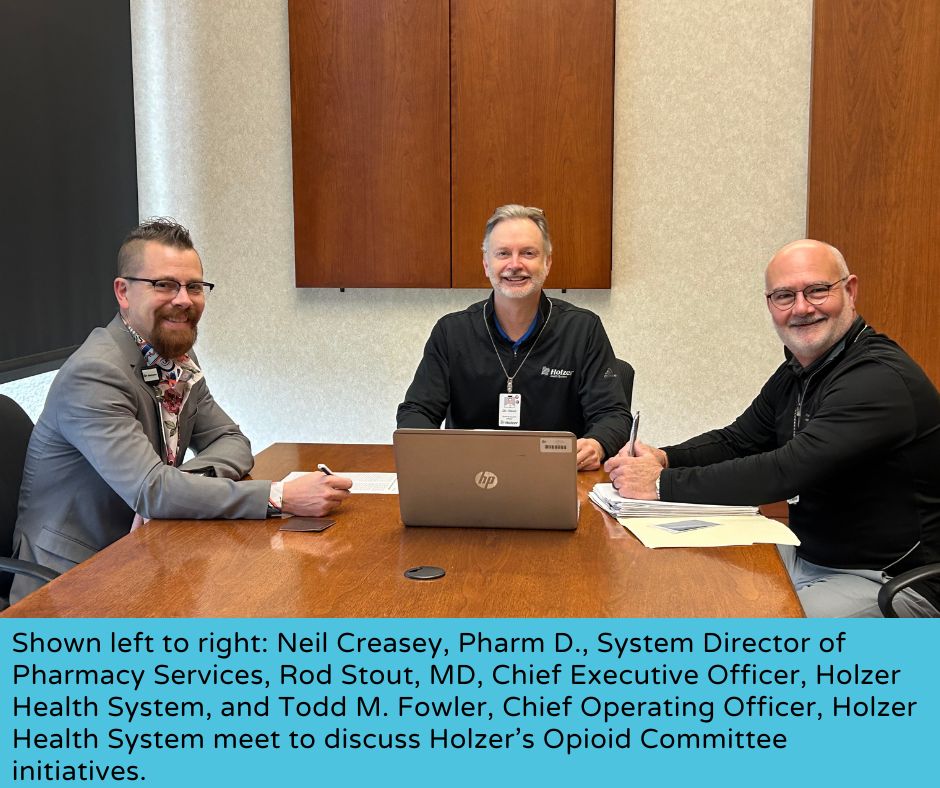Holzer Shares Stance on Opioid Epidemic
More than 1 million people have died since 1999 from a drug overdose. Nearly 75% of drug overdose deaths in 2021 involved an opioid. According to the US Department of Health and Human Services, over 10 million people misused prescription opioids in the past year.
Opioids are substances that work in the nervous system of the body or in specific receptors of the brain to reduce pain. The Centers for Disease Control and Prevention (CDC) reports that the number of overdose deaths involving opioids, including prescription opioids, heroin, and synthetic opioids (like fentanyl), in 2021 was 10 times the number in 1999. Overdoses involving opioids killed more than 80,000 people in 2021, and nearly 88% of those deaths involved synthetic opioids.

“Like any medication, the misuse of an opioid can lead to unwanted side effects such as severe nausea, vomiting, constipation, difficulty breathing or even death. Unfortunately, many people ignore those symptoms due to the possible euphoric effects of opioids that are short-lived but very powerful,” shares Rod Stout, MD, Chief Executive Officer of Holzer Health System “This leads to a patient increasing their usage beyond prescribed doses and a tolerance develops requiring larger doses to achieve the same perceived benefits but with increasing severe consequences. If a person becomes dependent on an opioid, the consequences to the body are felt both physically and mentally. As the body becomes dependent on the opioid, stopping can lead to withdrawal symptoms that could be as mild as body aches to severe flu-like symptoms. As patients attempt to avoid falling into those unpleasant withdrawal symptoms, a dependence on the opioid increases until full addiction can develop.”
In 2017, Holzer Health System chartered their Opioid Team. The Team assists the health system with provider, staff and patient education, prescribing guidelines, data management and evaluation, and community service involvement. According to Todd M. Fowler, Holzer Chief Operating Officer, the Opioid Team consists of multi-disciplinary staff including pharmacy, physician leadership, nursing, and administration. “Our team meets periodically throughout the year to evaluate the current status of opioid use and prescribing. We also assess changes in the pharmacologic recommendations as well as legislation around opioids. Our overriding goal is to reduce and hopefully eliminate inappropriate medication use,” stated Fowler.
Everyone is affected by opioid dependence. Some people are affected directly as medical consumers of opioids who require it for clinical treatment. Others are impacted by caring for these patients. In 2018, the CDC estimated the economic burden of opioid misuse to exceed that of 78.5 billion due to healthcare costs, lost labor productivity and recovery expenses.
“One way to prevent misuse of opioids is to take medications only as prescribed and dispose of any un-used quantity appropriately,” shared Neil Creasey, Pharm D., System Director of Pharmacy Services, Holzer Health System. Disposal of prescriptions can occur through nationally recognized event called ”Drug Take Back Day” that was developed for the purpose of removing unwanted/needed medications from our streets and communities. These national events are held in the Spring and Fall in your communities. If you would like to dispose of medications sooner and are an established Holzer patient, you can ask your provider for an RxDestroyer bottle that makes the medications unusable due to a chemical reaction. Another option is to drop unwanted medications off at your local sheriff’s office for proper destruction.
Creasey added, “Sharing medications with others is illegal. Any medication ordered for you by your provider cannot be shared with another person. The other major concern of sharing medications is the risk for unknown side effects, drug interactions and allergies that could cause severe injury or death to the very person you are attempting to help.”
If you feel someone is in crisis or needing to talk about opioid misuse, there are several toll-free lines for substance abuse counseling and help via the SAMSA Behavior Treatment Centers at 1-800-662-HELP. If you feel like your opioid use is escalating, talk to your doctor about treatment options to keep yourself in proper clinical care. If you are a family member or friend with concerns; please stop into your pharmacy and have a conversation about Naloxone and if it is appropriate for you to have on hand.
“At Holzer, we are committed to do our part to help patients avoid addictive medicines and to protect the health and well-being of our communities,” stated. Dr. Stout added, “Our staff have taken several measures to ensure opioid abuse is being addressed. Our Opioid Team and other related committees have been formed to standardize outpatient procedures, establish clear dispensing policies for opioids, participate in the National Drug Take Back Days in Gallia, Jackson and Meigs Counties, and to work with our local health departments and others in education and addiction support.”
About Holzer:
Holzer Health System, a not-for-profit entity, is a regional health system consisting of two hospital locations; multiple clinical locations; a dental care facility; long-term care entities; over 160 providers and more than 30 medical specialties and over 2400 employees. The system includes specialized services including Holzer Center for Cancer Care, Holzer Cardiovascular Institute; and Holzer Wound Care Center and receives more than 500,000 patient visits each year. For more information, visit www.holzer.org or call 1-855-4-HOLZER.